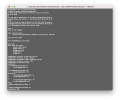Oh man, I just run into many problems after applying this workaround. Really, big time.
I don't know what might happened but my VM's, especially the one with smart home instance (Home Assistant) got messed. I was loosing connectivity to this VM (Web UI wasn't responding or loading), I also experienced some problems with connectivity between it's internal network interfaces, I guess. It literally gave me a bad headache.
Was it because I applied post-up to vmbr0? What should I do then to keep workaround but not mess VM's NIC at the same time?
I don't know what might happened but my VM's, especially the one with smart home instance (Home Assistant) got messed. I was loosing connectivity to this VM (Web UI wasn't responding or loading), I also experienced some problems with connectivity between it's internal network interfaces, I guess. It literally gave me a bad headache.
Was it because I applied post-up to vmbr0? What should I do then to keep workaround but not mess VM's NIC at the same time?


